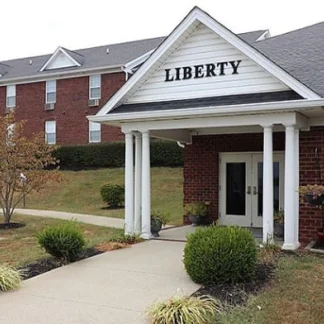The Ridge Behavioral Health System
The Ridge Behavioral Health System - Gibson Lane is located in Richmond, Kentuck...
Liberty Place Recovery Center for Women is a drug and alcohol addiction treatment center in Richmond, KY. It is a long term recovery program that provides support and hope for women recovering from substance use disorder.
Liberty Place Recovery Center for Women’s specialized residential level of care utilizes a recovery program model that includes:
The residential drug rehab program at Liberty Place is a 108 bed sober living environment centrally located on Lake Street in Richmond. It is designed to provide women with 24/7 care and support from a multidisciplinary team free of charge. During their stay, residents participate in community tasks and receive structured therapy, counseling, and educational sessions.
As residents move through their residential track, Liberty Place Recovery Center for Women offers vocational training programs and life skills services to help women develop practical skills, enhance their employability, and foster independence.
Additionally, Liberty Place Recovery Center for Women offers transitional housing options for women who have completed their initial treatment. Transitional housing provides a supportive and structured environment where women can continue to work on their recovery goals while gradually reintegrating into independent living.
Contact us for more information: (859) 625-0104

Connect with Liberty Place Recovery Center for Women by calling their admissions team directly.
(859) 625-0104 Website Get DirectionsGroup therapy is any therapeutic work that happens in a group (not one-on-one). There are a number of different group therapy modalities, including support groups, experiential therapy, psycho-education, and more. Group therapy involves treatment as well as processing interaction between group members.
In individual therapy, a patient meets one-on-one with a trained psychologist or counselor. Therapy is a pivotal part of effective substance abuse treatment, as it often covers root causes of addiction, including challenges faced by the patient in their social, family, and work/school life.
Life skills trainings involve all the skills a person must have in order to function successfully in the world. These include time management, career guidance, money management, and effective communication. Truly successful addiction recovery is based on the ability to not only live substance-free, but to thrive. Life skills teaches the practical necessities of functioning in society, which sets clients up for success in life, and therefore sobriety.
Recreational therapy (aka therapeutic recreation) uses creative and fun activities to help with addiction recovery. Recreational therapists lead patients in entertaining and engaging activities like sports or games; art (drawing, painting, sculpture); drama, music, and dance; and/or community outings (field trips) to improve patients' physical, social, and emotional well-being.
In individual therapy, a patient meets one-on-one with a trained psychologist or counselor. Therapy is a pivotal part of effective substance abuse treatment, as it often covers root causes of addiction, including challenges faced by the patient in their social, family, and work/school life.
Life skills trainings involve all the skills a person must have in order to function successfully in the world. These include time management, career guidance, money management, and effective communication. Truly successful addiction recovery is based on the ability to not only live substance-free, but to thrive. Life skills teaches the practical necessities of functioning in society, which sets clients up for success in life, and therefore sobriety.
Recreational therapy (aka therapeutic recreation) uses creative and fun activities to help with addiction recovery. Recreational therapists lead patients in entertaining and engaging activities like sports or games; art (drawing, painting, sculpture); drama, music, and dance; and/or community outings (field trips) to improve patients' physical, social, and emotional well-being.
Life skills trainings involve all the skills a person must have in order to function successfully in the world. These include time management, career guidance, money management, and effective communication. Truly successful addiction recovery is based on the ability to not only live substance-free, but to thrive. Life skills teaches the practical necessities of functioning in society, which sets clients up for success in life, and therefore sobriety.
Recreational therapy (aka therapeutic recreation) uses creative and fun activities to help with addiction recovery. Recreational therapists lead patients in entertaining and engaging activities like sports or games; art (drawing, painting, sculpture); drama, music, and dance; and/or community outings (field trips) to improve patients' physical, social, and emotional well-being.
Recreational therapy (aka therapeutic recreation) uses creative and fun activities to help with addiction recovery. Recreational therapists lead patients in entertaining and engaging activities like sports or games; art (drawing, painting, sculpture); drama, music, and dance; and/or community outings (field trips) to improve patients' physical, social, and emotional well-being.
The Ridge Behavioral Health System - Gibson Lane is located in Richmond, Kentuck...
Ethan Health is a CARF-accredited drug and alcohol addiction treatment center in...
Spero Health – Richmond (KY) is a private rehab located in Richmond, Kentucky. S...
Bluegrass - Madison County - Gibson Lane is located in Richmond, Kentucky. Blueg...